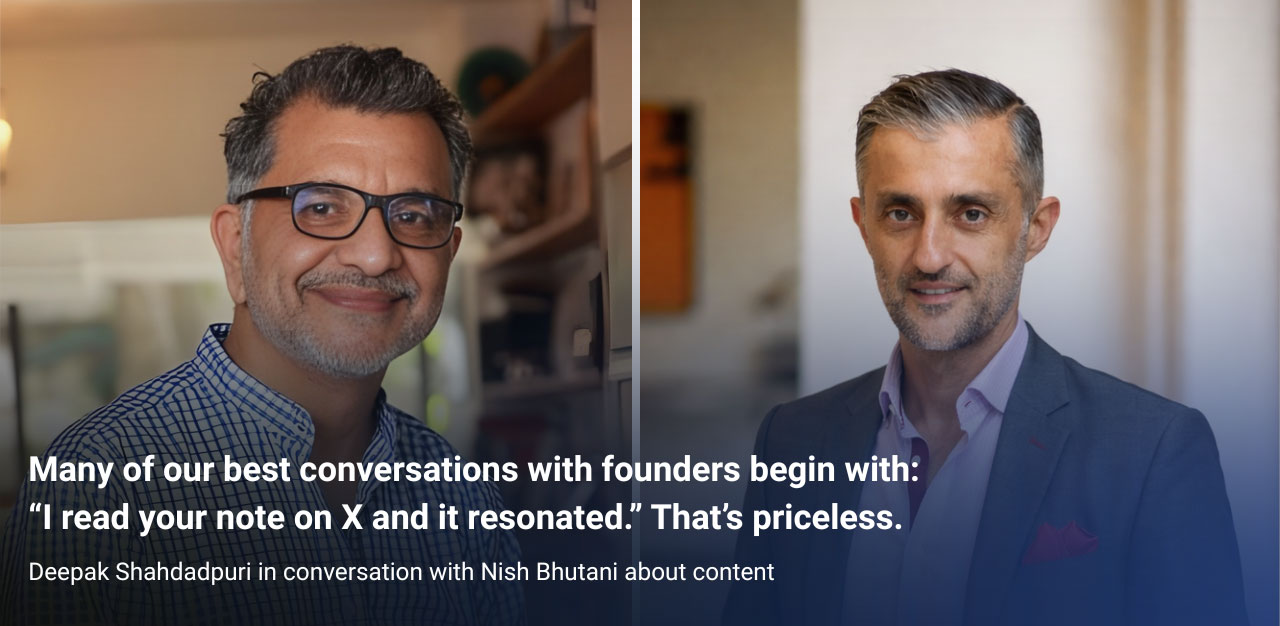Picture Credit: httpss://www.livemint.com/
By Nish Bhutani, Founder & CEO – Indiginus
As published in the Mint on Sunday, on August 27, 2017
One must face one’s fears since in many professions, remaining a tech ignoramus represents a growing disadvantage
The digital world keeps coming at you, growing in importance with each passing year, and—if you’re a tech neophyte—stoking your inner fears. The alphabet soup of acronyms gets thicker and murkier—SEM, SEO, CPI, CPA, CTR, RTB, AR, DMP, SMM, SMO, UX, OTT… Scarier still, these are mainly business, not technology, terms.
So, for the technologically challenged, does it mean fight or flight? I recommend neither. But allow me to set some context first, with a bit of my own personal history with the tech industry.
Growing up in a family of professionals, I faced the familiar binary of the 1980s—“Doctor, or engineer?” With no great self-awareness as a young adult, and cursed with the luxury of choice—a by-product of good results in all manner of academics—I was directionless.
My timid rebellion against doctor parents was to choose engineering. It took me two degrees and four years of working as a software engineer to figure out I didn’t want to be one. Showed ma and pa, didn’t I?
Fortunately, the internet came along. I went to business school (desi engineer with an MBA! By now the rebellion was well-and-truly quashed) and, in 1997, dived into a new kind of tech industry that was just beginning to take shape. This time, the builders were not just engineers, but also writers, editors, designers, and even TV and radio hosts. Grey and beige office colours gave way to yellow and green. My company—the online media publisher CNET—was cool. Quite suddenly, I was cool.
Back then, people were still digesting what it meant to be an internet company. It was common to speculate whether such-and-such-dot-com was a media or retail or technology business. Yahoo, the darling of the tribe, faced these identity questions for years. A related debate centred on who held the keys to success—the editors, or the technical architects; the user interface designers, or the hardcore coders? Nobody really knew.
Today, many would say, the nerds have won. Top venture capitalist Mark Andreesen famously proclaimed in 2011 that “software is eating the world”, upending every industry imaginable, unaware that it should sit politely beside the others. But even as they invade retail, media, hospitality, energy, transportation, King’s Landing, Winterfell and countless other foreign lands, most marauders, from Amazon to Google to Tesla, declare themselves to be tech companies at the core.
Top engineering talent is treasured, protected and bought for large sums. Sometimes, this takes novel, nearly cloak-and-dagger forms, like the US start-up that moved its entire engineering team to Portugal on the enticement of a year in Europe. The true motive was to keep them at a safe distance from corporate poachers. Whether the nerds have won or not, they are not doing too shabbily. You had to be Tom Cruise or Nicole Kidman once, to be treated this well.
We have not quite reached the same extremes in India, but digital is rising, and top engineering talent is hard to find. In every industry, there is growing awareness of the importance of digital software, practices and business models. Suddenly, everyone wants chief digital officers, even in sectors you would normally consider tech laggards—like a major Mumbai-headquartered real estate developer I spoke with recently. Software’s appetite has a palate for Indian flavours, it seems.
But what of non-techies in this techie world? They don’t understand technology, and often, they fear it. One senior executive I spoke with knows he must get out of his discomfort zone, but is embarrassed to ask for help. It is intimidating to keep up with an industry that is not only alien, but where the alien is a shape-shifting, constantly evolving chimera.
One must face one’s fears, however, since in many professions, remaining a tech ignoramus represents a growing disadvantage. This is not about putting up a fight, which sounds devoid of joy, or seeking flight, which maintains the status quo, but about looking at one’s shortcomings as a learning opportunity. All you need is an attitude of curiosity, and a willingness to communicate with those better versed.
The change must start from within. Shake off that inertia, and dive in. The internet has a wealth of sources on technology—okay, dauntingly too many. So, poke around, ask a tech-savvy friend and identify those that work for you. You can take some comfort in knowing that even highly skilled tech insiders cannot keep up with the deluge of evolving and varied technologies and practices. It is simply impossible.
Instead, we techies focus our energies on what matters to us currently, based on the project we’re on and the problems we are trying to solve. It is also important to be in a knowledge-hungry mindset, taking in new information on a daily basis. As a former colleague of mine observes, “In technology, keeping on learning is a matter of survival”. So, as you begin your education, focus on what is most relevant to you, and be okay with not understanding everything. Note down what you don’t comprehend, and find sources that explain things better.
There are introductory online courses on education sites such as Lynda.com and Udemy (filter your searches on both for the “beginner” skill level), explanatory videos on every tech trend on YouTube, numerous podcasts from internet luminaries such as LinkedIn founder Reid Hoffman, high-level overviews from industry associations such as the Internet Advertising Bureau, that explain online ecosystems in traditional terms, and, for people like the aforementioned executive, the Too Embarrassed to Ask podcast from the tech industry news source, Recode.net. Quora, the Q&A site, is another great place for answers. Often, the site already has answers for questions that may be tormenting you. When I go to technology vendor sites, the “About Us” page is the most useful in providing a high-level overview of what they do.
Facebook and Google provide online courses for their marketing platforms from the perspective of various business roles—ranging from executive to digital marketer. Together, these two giants command a majority share of global online advertising, so if you have an interest in marketing, these platforms are worth a deeper dig.
In conjunction with online learning, some books may be of interest. Harvard Business School professor Bharat Anand’s The Content Trap brilliantly summarizes some of the current thinking on internet strategy. Ryan Holiday explains some of the newer approaches to customer acquisition in Growth Hacker Marketing, while the revered marketing guru Philip Kotler provides a comprehensive and updated view of marketing today, in Marketing 4.0: Moving from Traditional to Digital. Whether or not you are starting a business, or a business-within-a-business, it is useful to understand how start-ups can best tackle uncertainty. The Lean Startup has become something of a Bible for today’s entrepreneurs and entrepreneurial managers.
When speaking with technologists in your organization, remember not to get sucked into technology-focused discussions, before clarifying project objectives, user needs, and the typical scenarios for how a new product being built will be used. It is more important to speak your language, than theirs. When conversations in the initial stages of a technology project have deteriorated into arcane detail, I have jokingly implored, “Can we speak in English please!”
Both engineers, and tech-inclined business people, can jump to detailed solutions, before fully understanding the problem. This confuses things, as the team loses sight of why one is doing something in the first place, as well as what needs to done, and jumps ahead to the how. Often, the result is a solution in search of a problem.
Good engineers, however, crave context about the business, and clarity about internal or external customer needs, ahead of getting into implementation details. The most important role you, as a non-technical person, can play, is to provide this context clearly, and in unambiguous language. This allows a good engineer, who now understands project goals and customer needs, to sensibly “fill in the blanks” where gaps exist (there are always blanks to be filled, and decisions and trade-offs to be made during implementation, as it is not possible for business folks to detail out every possible scenario).
While digital has changed the rules of business, many fundamentals remain the same. I have seen digital experts get caught up in the minutiae of execution, and miss the larger picture that only a businessperson can provide. A digital marketing team I worked with was so budget-driven, that it focused on acquiring users at the lowest per user cost, without analysing whether they were retained as subscribers. If the project’s business sponsor had articulated goals in the same plain language that any traditional subscription business, such as a print magazine, would, i.e., “use the free trial to get me long-term subscribers”, the team would not have gone wrong.
So, as a tech neophyte, shedding your fears is the first step. If your tech education has already begun, remember: this is a journey, not a destination. The era of education followed by a working life is over—the two are now intertwined. If knowing technology is important to your work or business, make it a regular habit. After all, who wouldn’t want to be on the metaphorical red carpet with tomorrow’s Cruises and Kidmans?




